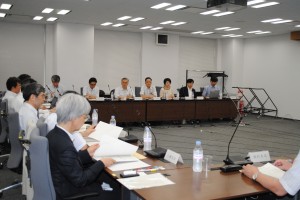This article contains more detailed information and updates concerning the on-going ILC decision process in Japan. The main components of this process were already introduced by Hitoshi Yamamoto in the 24-July issue of LC NewsLine.

The first meeting of the Particle and Nuclear Physics Working Group held on 24 June. Image courtesy: Iwate Nippo
In September 2013, the Science Council of Japan (SCJ) published a report on the ILC. This report contains two key statements and requests.
Concerning the scientific justification for the ILC:
“The Committee appreciates that the ILC enables the precision measurements of the detailed properties of the Higgs particle and the top quark, thereby exploring the physics beyond the Standard Model of particle physics and, therefore, it acknowledges that the ILC is endowed with the scientific value in particle physics. The Committee, however, expresses the desire for more compelling and articulate argument to justify the ILC project in order to search for unknown particles and the physics beyond the Standard Model, running concurrently with the upgraded LHC, given the considerable investment it will require.”
Concerning the project cost:
“Before making the final decision of whether the ILC should be hosted in Japan, the issues and concerns described in this document should be fully investigated and a clear vision for solutions needs to be provided. They include the whole profile of project cost for the construction, operation, upgrades and decommissioning, as well as prospect for cost-sharing among the countries involved. Also included are the issues related to human resources and management/operation organization.”
In response, the Ministry of Education, Sports, Science and Technology (MEXT) set up a “Task force for ILC” under the vice-Minister, which itself set up an “Academic Experts Committee” which first met in May 2014. At that meeting the committee formed two working groups in order to respond to the two key requests of the SCJ.
In order to address the scientific issues a “Particle and Nuclear Physics Working Group” led by Takaaki Kajita (Director of the Institute for Cosmic Ray Research, University of Tokyo) was formed. The timetable and subjects for meetings of this Working Group as known so far is as follows:
24 June 2014: Status of Particle Physics and ILC physics overview. (Minutes in Japanese)
29 July 2014: Future prospects in the US and Europe (Minutes in Japanese)
27 August 2014: Cosmic ray and Astrophysics and ILC.
22 September 2014: Flavour and neutrino physics and ILC
21 October 2014: Interim summary to be reported to Experts Committee.
In order to address technical issues, a “Technical Design Report Validation” Working Group has been formed under the leadership of Hideaki Yokomizo (Former Trustee of JAEA). The first open meeting of this working group was held on 30 June 2014, giving an overview. Further working group meetings are in progress for detailed discussions on the TDR contents with cost-estimates in closed sessions.
Information is being fed to this working group through the ILC Planning Office at KEK after verification by the LCC. Note that at the present time, this is a purely internal Japanese process. All committee and working group members are Japanese and no input is requested from outside Japan except indirectly through the LCC so far.
In addition to setting up this Committee and its Working Groups, on 19 August MEXT published a Call for Tender for a survey:
“Research, survey and analysis on technology spinoffs and subsequent economic ripple effects expected from the International Linear Collider (ILC) project and the global trend of the particle/nuclear physics research including technology R&D.”
This survey will be conducted by a private company, yet to be chosen, and should be completed by the end of March 2015. It is expected that this company will consult with the major laboratories world-wide.
I hope that the upcoming LCWS14 workshop in Belgrade will help refine the scientific arguments and differentiate the International Linear Collider from the other proposed lepton colliders and help our Japanese colleagues to feed correct and compelling arguments to the working groups.


Recent Comments